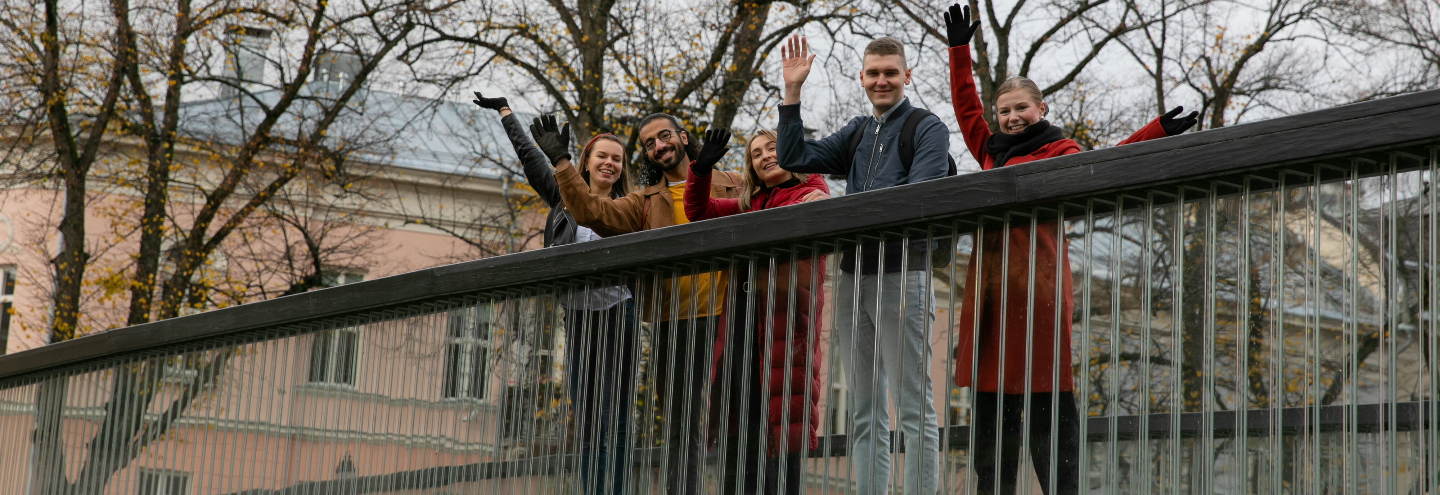Bachelor’s Degree Programme in Sustainable and Social Entrepreneurship
Do you want to help organisations become more sustainable? Study to become a leader with an entrepreneurial mindset skilled in driving positive social, environmental, and economic impact.
The Bachelor's Degree Programme in Sustainable and Social Entrepreneurship educates the next generation of managers, entrepreneurs, and experts committed to creating both sustainable development and economic well-being.
The programme combines business understanding with in-depth entrepreneurship studies and versatile multidisciplinary studies in sustainability and social issues. It goes beyond the classroom, offering hands-on experience through our Entrepreneurs-in-Residence programme and active connections with the business community. You will also be able to take courses in Finnish and other languages.
With its motto ‘TSE for sustainable futures’, the Turku School of Economics provides a strong basis for becoming an expert in building positive future developments. TSE is an internationally recognized institution, ranked among the top 1% of business schools globally and accredited by AACSB. All of its activities are based on quality research in business and economics. You'll be part of a collaborative, research-based learning community where students contribute to the creation of new knowledge.
In your future career, you will work as a (social) entrepreneur, as a manager in a company based on regenerative business principles, or as an expert in a third sector organisation (NGO, association, foundation) working towards addressing the UN’s Sustainable Development Goals. This programme is a particularly interesting opportunity for students from regions where economic activity has been based on traditional industry and new economic opportunities are arising.
Entry requirements
Before you start preparing your application, always read the full admission requirements on the application portal Studyinfo.fi
You can apply for admission if you have previously completed or will complete one of the following qualifications in the spring when you apply:
- the Finnish matriculation examination
- the International Baccalaureate (IB) diploma, the European Baccalaureate (EB) diploma, the Reifeprüfung (RP)/ the Deutsches Internationales Abitur (DIA) diploma in Finland, or the Cambridge Advanced International Certificate of Education (AICE)
- vocational upper secondary qualifications, a vocational degree or a specialised vocational degree as referred to in the Finnish Vocational Education and Training Act (531/2017)
- foreign qualifications which in the awarding country confer eligibility to pursue an equivalent university degree
You will also be eligible to apply if you meet one of the following requirements:
- you have been granted the right to study for a university degree in Finland
- you hold a degree conferred by a Finnish higher education institution or a degree conferred by a foreign institution that is at least equivalent to a bachelor’s degree
Before you start preparing your application, always read the full admission requirements on the application portal Studyinfo.fi
If you already have a Finnish Bachelor’s (or higher) Degree in the field of business administration, you are not eligible to apply.
Admission quota for the programme is 20.
There are two admission groups for gaining admission:
Admission group I (70 %): admission is based on the results of the SATs. Required test sections: Evidence Based Reading and Writing and Mathematics sections.
Information about the SATs can be found at https://www.collegeboard.org/. Digital SAT is accepted.
The SAT cannot have been completed more than two years prior to the end of the application period.
Admission group II (30 %): certificate-based admission - based on the admission score, which is calculated based on the grades achieved in the Finnish matriculation examination, International Baccalaureate, European Baccalaureate, or Reifeprüfung/Die Deutsche Internationale Abiturprüfung.
Points are calculated according to the following national scoring guidelines:
- Scoring based on points obtained in the Finnish matriculation examination (business studies)
- Scoring based on points obtained in the IB, EB or DIA/RP degree
If you meet the minimum requirements for both admission groups, you can be considered in both Admission Group I and Admission Group II.
Programme in brief
The extent of the programme is 180 ECTS credits and the degree is designed to be completed in three years. In addition to basic studies, students take major studies in entrepreneurship, specialisation studies (sustainable and social business), and minor and elective studies (based on their choice). In addition, they will take language studies and optional studies. Students should note that this is a full-time programme and most courses have compulsory attendance.
During the 1st year, the students will build a strong grounding for their studies through basic studies (business studies, sustainability studies and languages) by learning basic concepts, theories and topics. During the 2nd year the students will focus on their major studies in entrepreneurship. Specialisation studies are taken during the 2nd and 3rd year (depending on the course requirements). Students write their B.Sc. thesis during the 3rd year.
The programme builds on theoretical, research-based knowledge and educates students to apply analytical tools to examine business and social problems. Learning takes place frequently in teams and involves working with real-life cases (businesses) interactively. The students will learn to develop arguments and communicate them (presentations). The graduates understand the role of social and sustainable businesses for individuals, organisations, and society. They can identify challenges of changing environment and possess the knowledge of relevant theories and practices to meet them.
Does this page answer your questions about the programme's content and academic matters? If not, contact basse@utu.fi.
Entrepreneurship is a well-established research area at the Turku School of Economics (TSE). Research on entrepreneurship is conducted in close collaboration with different disciplines. Entrepreneurship research is conducted at the individual, organisational and societal levels. At the individual level our research is focused on entrepreneurial identity, gender and entrepreneurship education, for example. Organisational level research focuses on entrepreneurial behaviour and intrapreneurship in different organisations. The role of entrepreneurship in changing societies is studied in different economic, social and cultural contexts.
Studies are offered in close collaboration with other disciplines and faculties, including the sustainable business researchers at the Management and Organisation Studies, and with Futures Research Centre. We also rely on expertise on sustainability and social issues at the University of Turku broadly as well as in other collaborating universities (Åbo Akademi, Turku University of Applied Sciences).
During the 3rd year, the students will write a B.Sc. thesis on an entrepreneurship topic based on their choice. It is also an opportunity for the student to develop their expertise in an area relevant for them. The thesis work will include group meetings (opportunity to give and receive peer feedback) facilitated by a thesis supervisor.
The specialisation studies in Sustainable and Social Business will equip the students with the knowledge and skills necessary to develop and manage businesses and organisations in a regenerative manner. After the studies the students can lead and innovate in ways that contribute and create positive social, environmental and economic impact.
The students are encouraged to take an internship to enhance their academic learning, to gain a competitive edge in the job market, and to be more prepared for their future careers.
Career prospects
After completing this programme, you will be able to:
Apply analytical tools to examine societal, environmental and economic problems
Develop well-justified arguments and communicate them effectively
Work interactively in teams
Understand the social responsibility of your profession in the long term
Understand the role of social and sustainable business for individuals, organisations and society
Identify challenges in their environment and possess knowlegde of relevant theories and practices to meet them.
In your future career you will work as a (social) entrepreneur, as a manager in a company based on regenerative business principles or as an expert in a third sector organisation (NGO, association, foundation) working towards addressing the UN’s Sustainable Development Goals.
The programme gives you eligibility to apply to Master’s studies. At the University of Turku, interesting programmes for a graduate might be, for example, the Global Innovation Management programme or Futures Studies at Turku School of Economics.
The programme also gives you eligibility to apply to Master’s degree studies in other universities in Finland and abroad. Universities in Finland, such as University of Jyväskylä, Tampere University, University of Eastern Finland, Aalto University, University of Vaasa, University of Oulu, Åbo Akademi and Lappeenranta-Lahti University of Technology have international master programmes that are viable options for our graduates. Fields such as Sustainable Business Development, International Business and Entrepreneurship, Sustainability Leadership, Sustainable Entreprenership, Sustainable Global Business, Global Management, and Corporate Environmental Management are potential areas of focus for further studies.
Please note that admission to Master's degree programmes is competitive and not automatic. However, this programme provides a strong foundation for applying to a wide range of Master's studies in Finland and abroad. Please check the specific admission requirements of each programme before applying.

